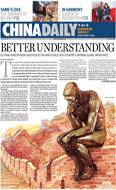Politics
Why the US had it wrong about bin Laden's hideout
Updated: 2011-05-05 10:15
(Agencies)
But at the time, that hunch didn't prove anything. Bin Laden would be well fed, protected and cared for, even along the hostile border with Afghanistan, the analysts concluded. With no reliable informants and no electronic surveillance, there was simply not enough to change the prevailing wisdom. Some in the Counterterrorism Center believed bin Laden was hiding in Dir, a far-flung town on Pakistan's northern border.
"There were many of us who felt increasingly that the Waziristan leads were drying up rapidly," said Rob Dannenberg, the Counterterrorism Center's former chief of operations. "As our technical and human coverage increased in that part of the world, as challenging as it might have been, I think a lot us of felt that it wasn't feasible that he was going to be able hide in that type of environment."
Goss said he was always confident that bin Laden was in northern Pakistan but never had any indication he was in a densely populated area so far to the east.
"It was not the circumstance I thought was the likely one. It was further down the list," Goss said in a telephone interview Wednesday. "That fact, to me, needs more explanation."
US officials have raised questions about whether their Pakistani counterparts knew, or should have known, that bin Laden was hiding in a town that's home to the country's military academy. Pakistan officials have flatly denied that and say they, too, were caught by surprise.
"It is shockingly embarrassing," former Pakistani President Pervez Musharraf told MSNBC on Wednesday.
While the CIA was wrong about the location of bin Laden's hideout, it was absolutely right about how the US would someday get the terrorist mastermind. CIA officers believed for years that bin Laden's vulnerability was his reliance on couriers. In fact, sometime in 2006 or 2007, the agency all but stopped chasing reported bin Laden sightings, which had always been dead ends, and made the couriers the primary focus of their hunt, a former senior intelligence official said.
It was around that time that the CIA had learned the true identity of a trusted courier known by the nom de guerre Abu Ahmed al-Kuwaiti. Piecing together intelligence gathered from captured terrorists over the course of several years, the agency was confident that if it found al-Kuwaiti, it could be the best shot at finding bin Laden.
Finally, in the middle of last year, al-Kuwaiti was caught on a wiretap. He was far from bin Laden's compound, but it was enough to put the CIA on his tail. Last fall, he unwittingly led the agency to bin Laden's doorstep.
When President Barack Obama announced bin Laden's death, former officials said the years of fruitless searches were wiped away.
"People in the agency aren't used to seeing their work in a favorable light on Page One," former CIA Director Michael Hayden said Wednesday. "After this kind of work, this painstaking attention to detail, it's really heartening for them to see the reward for it on the battlefield, and the reward in the minds and heart of the countrymen."
Goss said he got a courtesy call on Sunday, cryptically telling him to watch the news that night. He said it was clear what was about to be announced.
"My feeling was it was certainly worth the wait," he said.
E-paper

Head on
Chinese household care goods producers eye big cities, once stronghold of multinational players
Carving out a spot
Back onto center stage
The Chinese recipe
Specials

Bin Laden dead
The world's most wanted man was killed in a US raid in Pakistan.

British Royal Wedding
Full coverage of the royal wedding of Prince William and Kate Middleton in London. Best wishes

The final frontier
Xinjiang is a mysterious land of extremes that never falls to fascinate.
